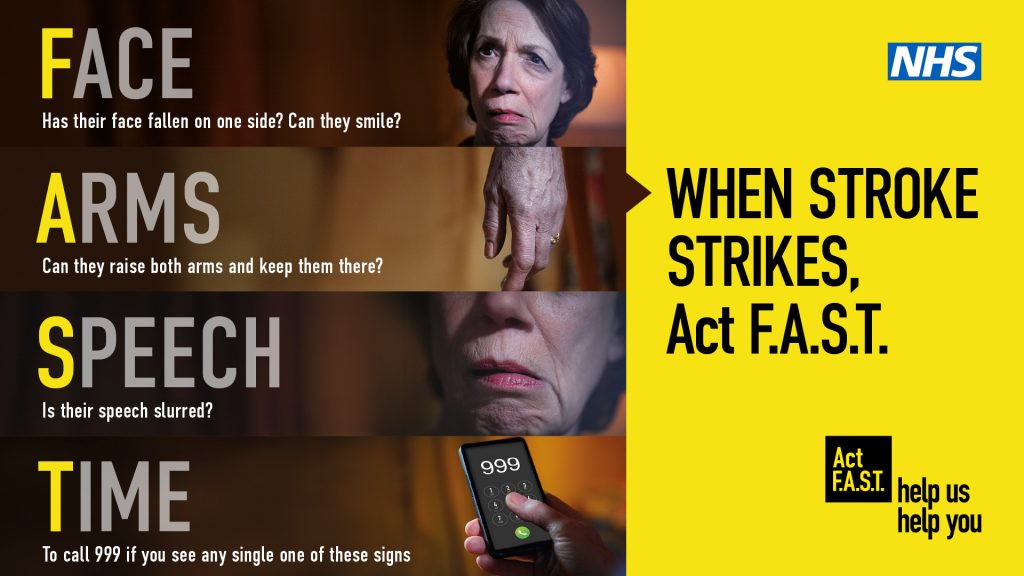
On 8 March 2021, Public Health England, supported by the Stroke Association, will relaunch the national “Act F.A.S.T.” stroke campaign. There are more than 100,000 incidence of stroke each year in the UK, causing around 34,000 deaths. [1]
The latest data show a 12% drop in hospital attendances for stroke during the lockdown period of the pandemic, between March – April 2020 [2]
With current national restrictions in place, there’s an even greater need to run this campaign activity to remind people of the symptoms and reinforce the importance of acting F.A.S.T. and calling 999 if you notice any single one of the signs in yourself or others.
The F.A.S.T. (Face, Arms, Speech, Time) acronym has featured in the advertising for a number of years and provides a memorable way of identifying the most common signs of a stroke, whilst emphasising the importance of acting quickly by calling 999.
Think and Act F.A.S.T.
- Face – has their face fallen on one side? Can they smile?
- Arms – can they raise both arms and keep them there?
- Speech – is their speech slurred?
- Time to call 999 if you see any single one of these signs of a stroke
When Stroke Strikes Act F.A.S.T. Call 999
A stroke is known as a ‘brain attack’. It is a medical emergency that requires immediate attention as every minute is vital. That is why calling 999 is so crucial. An ambulance can give stroke patients those extra precious minutes, through faster and more specialist treatment via their knowledge of the nearest appropriate Hyper Acute Stroke Unit.
Whether it is a friend, loved one or even a stranger, dialing 999 quickly and acting F.A.S.T saves lives and gives stroke patients their best chance at recovery and could reduce the long-term effects.
Some other signs that may be due to a stroke or mini stroke include:
- Sudden loss of vision or blurred vision in one or both eyes
- Sudden weakness or numbness on one side of your body (including in your leg)
- Sudden memory loss or confusion
- Sudden dizziness, unsteadiness or a sudden fall, especially with any of the other signs
- Call 999 immediately if you notice any single one of the signs of stroke.
COVID-19 MESSAGING
- Safe systems of working including infection prevention and control administrative and environmental controls are in place across the NHS.
- The NHS is here to see you, safely.
FOR MORE INFORMATION
Search ‘Act FAST’ or visit www.nhs.uk/ActFAST for more information.
FACTS AND STATS
- Stroke is the fourth single leading cause of death in the UK and the single largest cause of complex disability costing the NHS £2.8 billion (and the wider economy over £9 billion) each year.
- There are more than 100,000 incidence of stroke each year in the UK. This is around one stroke every five minutes.
- The latest data show a 12% drop in hospital attendances for stroke during the lockdown period of the pandemic, between March – April 2020
- Stroke is an inequalities issue with black people being twice as likely to have a stroke than white people. On average, people of Black African, Black Caribbean and South Asian descent in the UK have strokes when they are younger. With COVID-19 disproportionately affecting these groups, there’s an even greater need to ensure that they aren’t being affected by other conditions. The campaign will include specific activity targeted at ethnic minority communities.
- PHE data suggests that there were 1,413 excess deaths from Stroke between 21 March 2020 and 22 January 2021, 7% higher than expected.
- With the current national restrictions in place, there’s an even greater need to run this campaign activity to remind people of the symptoms, and to take urgent action.
[1] Stroke Association 2018: The State of the Nation https://www.stroke.org.uk/sites/default/files/state_of_the_nation_2018.pdf
[2] Kings College London, An insight into stroke care during COVID-19 webinar, Presentation slides
